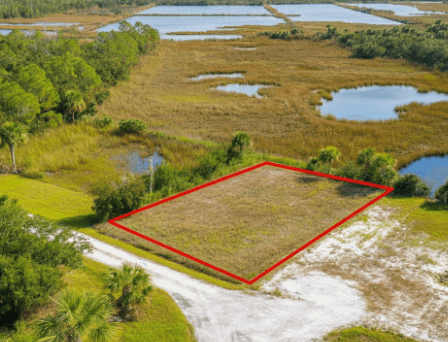Navigating property rights can be a complex landscape, particularly regarding landlocked properties. A common question among property owners and buyers in Florida is, “Can you deny access to landlocked property?” This issue often ignites heated discussions surrounding easements and the rights of landowners. In this blog, we will delve into the legal frameworks and considerations surrounding this question, clarifying whether property owners in Florida have the authority to deny access to landlocked properties. By examining legal precedents, we aim to shed light on the implications of this critical question: “Can you deny access to landlocked property?”
Steve Daria and Joleigh, seasoned real estate investors in Florida, often encounter the complexities surrounding landlocked properties in their ventures. They emphasize the importance of understanding easement rights, which can significantly impact property value and accessibility. Through their experiences, Steve and Joleigh illustrate how knowledge of legal frameworks can empower property owners and investors when navigating access disputes.
What is Landlocked Property?
A landlocked property is a parcel of land that is completely surrounded by other properties and lacks direct access to a public road or highway.
This absence of access can significantly complicate various aspects of property use, such as the ability to develop, maintain, or even sell the land.

Common Causes of Landlocked Property
A property can become landlocked for various reasons, including:
Subdivision of Land
When a larger parcel of land is subdivided into smaller lots, it’s possible for some of these sections to end up landlocked if they do not have direct access to a public road.
This situation often occurs when developers create new lots without ensuring that each one has a clear route to the surrounding infrastructure.
Consequently, these landlocked parcels may face significant challenges related to property development, access, and resale.
Resolving such issues typically requires negotiating easements with neighboring property owners or planning new access routes.
Natural Barriers
Natural features such as rivers, mountains, or dense forests can create significant barriers that isolate a property from public roads.
These natural obstacles can make it difficult or impossible to establish direct access to the land, complicating the development and use of the property.
In such cases, landowners may need to seek creative solutions, such as constructing bridges or negotiating access rights through neighboring lands, to overcome these barriers.
Understanding the impact of natural features on property access is crucial for both current owners and potential buyers.
Man-Made Barriers
Construction projects such as highways, railways, or large-scale developments can create man-made barriers that isolate a property from existing public roads.
When infrastructure is built without considering the access needs of surrounding properties, landlocked parcels can result.
Property owners may then need to negotiate with government agencies or developers to establish new access routes or secure easements.
These man-made barriers can significantly impact the property’s value and usability, making it essential to address access issues proactively.
Get Started: Get Your Cash Offer Below…
We are direct land buyers. There are no commissions or fees and no obligation whatsoever. Start below by sharing where your property is and where we can send your offer…
Easements Explained
An easement is a lawful right to use someone else’s land for a particular purpose, such as access to a landlocked property.
Easements can be made through various means, including mutual agreements and court orders.
Types of Easements
- Express Easement: This type of easement is explicitly granted by the property owner in written form, often included in the property’s deed.
- Implied Easement: An implied easement arises from the circumstances surrounding the property’s use, even if not explicitly stated in writing.
- Easement by Necessity: This easement is granted when a property is landlocked and requires access across neighboring land to reach a public road.
Creating and Enforcing Easements
Establishing an easement involves legal documentation and, sometimes, court intervention.
Property owners must negotiate terms and ensure the easement is properly recorded to avoid future disputes.
Can You Deny Access to Landlocked Property?
Here are the essential answers to the question, “Can you deny access to landlocked property?”
Legal Obligations
In Florida, property owners generally cannot deny access to landlocked property.
Courts often grant easements by necessity to ensure landlocked properties have practical access to public roads.
Exceptions to the Rule
While denying access is uncommon, exceptions exist.
If an alternative access route is available or the landlocked property was intentionally created without access, courts may deny an easement by necessity.
Legal Precedents
Several Florida court cases have reinforced the principle that access to landlocked property is a fundamental right.
These precedents guide current legal interpretations and property owner obligations.
Strategies to Resolve Access Issues
Here’s how you can deal with landlocked property and resolve access issues:
Negotiating with Neighbors
Open communication with neighboring property owners can lead to mutually beneficial agreements.
Negotiating an express easement can resolve access issues without court intervention.
Legal Action
When negotiation fails, property owners may need to seek legal remedies.
Filing a lawsuit to establish an easement by necessity is a common approach, though it can be time-consuming and costly.
Purchasing Adjacent Land
Acquiring a small portion of neighboring land can create direct access to a public road.
This approach requires negotiation and financial investment but can provide a permanent solution.

Tips for Property Owners
Can you deny access to landlocked property in Florida? Here are the essential tips for property owners:
Conduct Thorough Research
Before purchasing land, investigate access rights and any existing easements.
Understanding these factors can prevent future legal disputes and financial burdens.
Consult Legal Experts
Engaging real estate attorneys or land use experts can provide valuable guidance.
Their skill ensures compliance with legal requirements and helps secure necessary easements.
Document Agreements
Any agreements regarding easements should be documented in writing and recorded with local authorities.
Proper documentation protects all parties involved and ensures the easement’s enforceability.
Frequently Asked Questions
Can you deny access to landlocked property in Florida? Explore the most common queries:
What options does a landlocked property owner have for gaining access?
A landlocked property owner can seek to negotiate an easement with neighboring property owners, file for a court-ordered easement, or explore alternative means of access.
How can I obtain an easement for access to my landlocked property?
Landlocked property owners typically need to contact adjacent property owners for negotiations to obtain an easement.
If an agreement cannot be reached, the matter may need to be taken to court.
What legal protections do landlocked property owners have in Florida?
Florida law provides certain protections for landlocked property owners, allowing them to pursue legal means to establish access to their property.
Consulting with an attorney familiar with property law is crucial for navigating these options.
Conclusion
Understanding whether you can deny access to landlocked property in Florida is crucial for property owners, buyers, and investors. Navigating the legal landscape requires knowledge of easements, negotiation skills, and, sometimes, legal action. By conducting thorough research, consulting experts, and documenting agreements, you can effectively address access issues and maximize your property’s potential.
**NOTICE: Please note that the content presented in this post is intended solely for informational and educational purposes. It should not be construed as legal or financial advice or relied upon as a replacement for consultation with a qualified attorney or CPA. For specific guidance on legal or financial matters, readers are encouraged to seek professional assistance from an attorney, CPA, or other appropriate professional regarding the subject matter.
